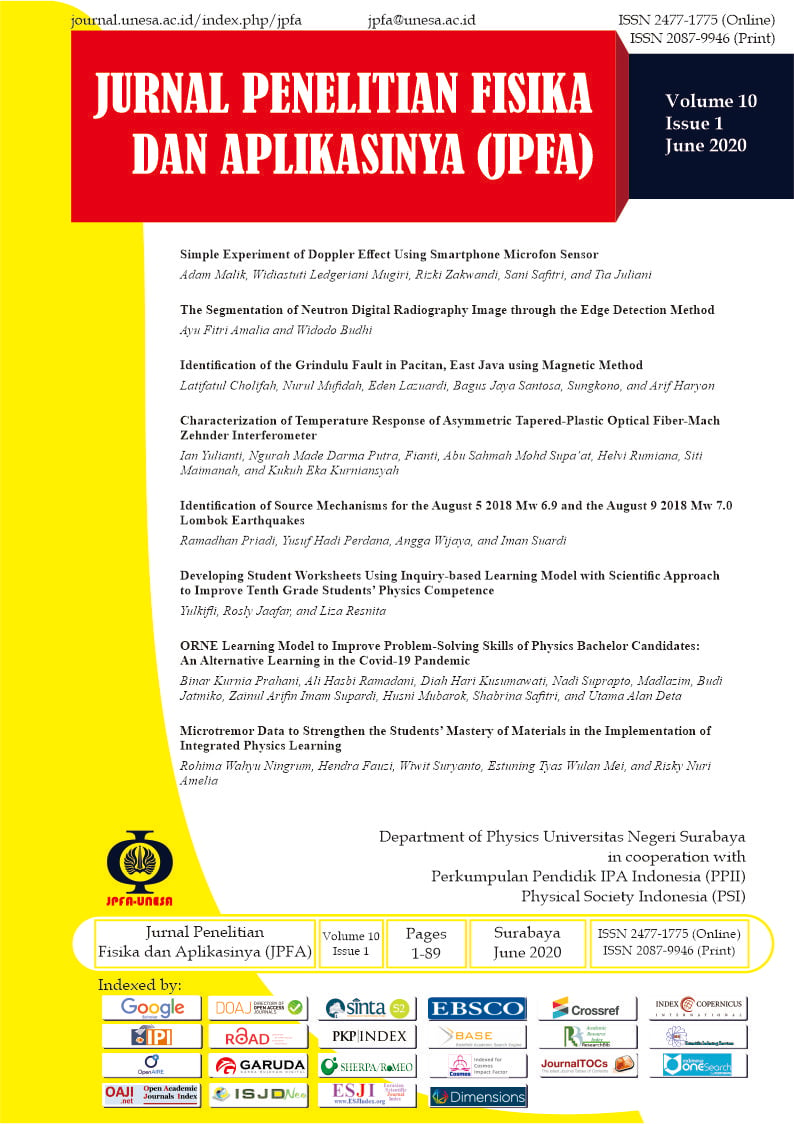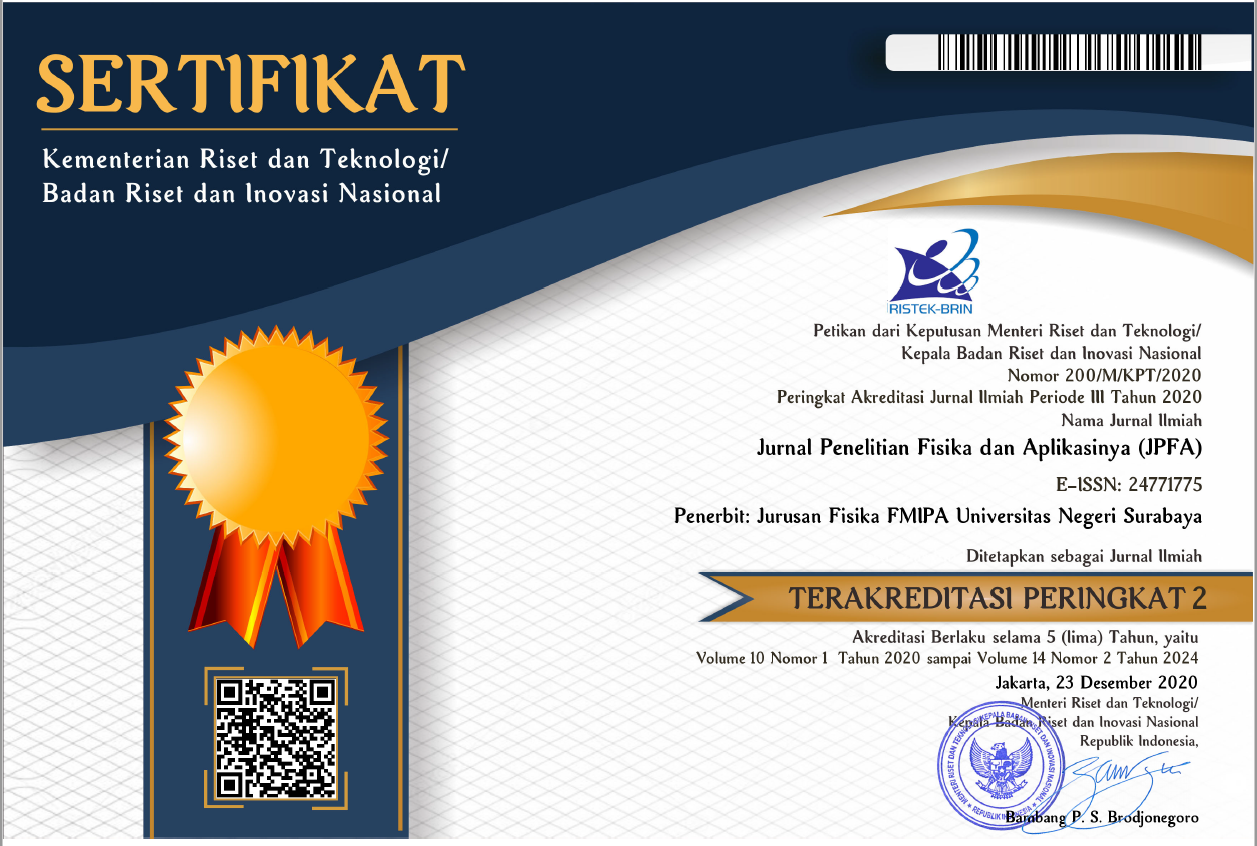Developing Student Worksheets Using Inquiry-based Learning Model with Scientific Approach to Improve Tenth Grade Students Physics Competence
DOI:
https://doi.org/10.26740/jpfa.v10n1.p56-70Keywords:
student worksheets, inquiry-based learning, scientific approachAbstract
Students' Physics Competencies are not still optimal. One of the causes is the use of student worksheets as the teaching materials that have not yet been suitable for the structure of good student worksheets. In addition, the student worksheets are not developed using the inquiry-based learning model and scientific approach. The purpose of this study is to describe the characteristics and produce valid, practical, and effective student worksheets using the inquiry-based learning model with a scientific approach to improve the tenth-grade students' physics competencies. This research used the Plomp model as the design, which consisted of preliminary research, development or prototyping, and assessment. The data were analyzed using a descriptive percentage technique, describing the student worksheets' validity, practicality, and effectiveness. Based on the preliminary research results, it was found that needs analysis, student analysis, and material analysis were required to be a reference in developing student worksheets using the inquiry-based learning model with a scientific approach. The design stage results show that the student worksheets have been designed using an inquiry-based learning model with a scientific approach. The results of the development phase show that the student worksheets meet the valid criteria of 0.94. The implementation phase results show that the student worksheets meet the very practical criteria based on the teacher's and students' responses, with the percentage of 91.05% and 78.39%, respectively. The results of the evaluation phase show that the student worksheets meet the effective criteria, including attitude (85.81%), knowledge (85.46%), and skills (85.69%). Based on the results of the study, it is concluded that the student worksheets using the inquiry-based learning model with an effective scientific approach to improve the tenth-grade students' physics competencies.
References
Severinus D. Pembelajaran Fisika Seturut Hakekatnya Serta Sumbangannya Dalam Pendidikan Karakter Siswa. Prosiding Seminar Nasional 2nd Lontar Physics Forum 2013. Universitas PGRI Semarang; LPF1311. Available from: http://prosiding.upgris.ac.id/index.php/lpf2013/lpf2013/paper/viewFile/121/73.
Octaviana K and Supriyono. Pengembangan Alat Peraga Hukum Kepler Sebagai Media Pembelajaran Fisika Pada Materi Hukum Kepler. Jurnal Inovasi Pendidikan Fisika (JIPF). 2017; 6(2): 5-9. Available from: https://jurnalmahasiswa.unesa.ac.id/index.php/inovasi-pendidikan-fisika/article/view/21715.
Darwata SR, Yulkifli, and Yohandri. Validity of Student Worksheet Oriented on POE Model as Digital Practicum Tool. Journal of Physics: Conference Series. 2019; 1185: 012124. DOI: https://doi.org/10.1088/1742-6596/1185/1/012124.
Yulkifli, Ningrum MV, and Indrasari W. The Validity of Student Worksheet Using Inquiry-Based Learning Model with Science Process Skill Approach for Physics Learning of High School. Jurnal Penelitian dan Pengembangan Pendidikan Fisika. 2019; 5(2): 155-162, DOI: https://doi.org/10.21009/1.05210.
Gurria A. PISA 2012 Results in Focus: What 15-year-olds Know and What They can do with What They Know. Programme for International Students Assessment, OECD; 2014. Available from: https://www.oecd.org/pisa/keyfindings/pisa-2012-results-overview.pdf.
Romli S, Abdurrahman, and Riyadi B. Designing Students Worksheet Based on Open-ended Approach to Foster Students Creative Thinking Skills. Journal of Physics: Conference Series. 2018; 948 (1): 012050. DOI: https://doi.org/10.1088/1742-6596/948/1/012050.
Asrizal, Amran A, Ananda A, and Festiyed. Effects of Science Student Worksheet of Motion in Daily Life Theme in Adaptive Contextual Teaching Model on Academic Achievement of Students. Journal of Physics: Conference Series. 2019: 1185: 012093. DOI: https://doi.org/10.1088/1742-6596/1185/1/012093.
Yulkifli, Afandi Z, and Yohandri. Development of Gravity Acceleration Measurement using Simple Harmonic Motion Pendulum Method Based on Digital Technology and Photogate Sensor. IOP Conference Series: Materials Science and Engineering. 2018; 335: 012064. DOI: https://doi.org/10.1088/1757-899X/335/1/012064.
Kemendikbud. Peraturan Menteri Pendidikan dan Kebudayaan Nomor 81 A Tahun 2013 Tentang Implementasi Kurikulum. Jakarta: Kementerian Pendidikan dan Kebudayaan; 2013.
Hamruni. Strategi Pembelajaran. Yogyakarta: Insan Mandiri; 2012.
Yudha SFA, Yulkifli, and Yohandri. Validity of Student Worksheet Based on Guided Inquiry Learning Model Assisted by Digital Practicum Tool. Journal of Physics: Conference Series. 2019; 1185: 012058. DOI: https://doi.org/10.1088/1742-6596/1185/1/012058.
Pedaste M, Mäeots M, Siiman LA, de Jong T, van Riesen SAN, Kamp ET, Manoli CC, Zacharia ZC, and Tsourlidaki E. Phase of Inquiry-based Learning: Definition an the Inquiry Cycle. Educational Reseach Review. 2015; 14: 47-61. DOI: https://doi.org/10.1016/j.edurev.2015.02.003
Bayram Z, Oskay OO, Erdem E, Ozgur SD, and Sen S. Effect of Inquiry-based Learning Method on Students Motivation. Procedia-Social and Behavioral Science. 2013; 106: 988-996. DOI: https://doi.org/10.1016/j.sbspro.2013.12.112
Rodriguez G, Perez N, Nunez GB, Banos JE, & Carrio M. Developing Creative and Research Skills Through an Open and Interprofessional Inquiry-based Learning course. BMC Medical Education. 2019; 19: 134. DOI: https://doi.org/10.1186/s12909-019-1563-5.
Thaiposri P and Wannapiroon P. Enhancing Students Critical Thinking Skills Through Teaching and Learning by Inquiry-Based Learning Activities Using Social Network And Cloud Computing. Procedia-Social and Behavioral Science. 2015; 174: 2137-2144. DOI: https://doi.org/10.1016/j.sbspro.2015.02.013
Fernandez FB. Action Research in the Physics Classroom: the Impact of Authentic, Inquiry-based Learning or Instruction on the Learning of Thermal Physics. Asia-Pacific Science Education. 2017; 3: 3. DOI: https://doi.org/10.1186/s41029-017-0014-z.
Simsek P and Kabapinar F. The effect of Inquiry-based Learning on Elementary Students Conceptual Understanding of Mater, Scientific Procces Skils and Science Attitudes. Procedia-Social and Behavioral Science. 2010; 2(2): 1190-1194. DOI: https://doi.org/10.1016/j.sbspro.2010.03.170
Prabandaru RH. Keefektifan Model Inquiry-based Learning Terhadap Penguasaan Kompetensi Pengoperasian Peralatan Pengendali Daya Tegangan Rendah Kelas XI Di SMK Negeri 1 Sedayu. Thesis. Published. Yogyakarta: Universitas Negeri Yogyakarta; 2015.
Sasmita PR. Pengembangan Perangkat Pembelajaran Fisika Dengan Strategi Pembelajaran Inkuiri Terbimbing Berbasis Pendekatan Saintifik Untuk Meningkatkan Kompetensi Belajar Fisika Peserta Didik Pada Materi Suhu, Kalor dan Perpindahan Kalor. Master Thesis. Unpublished. Padang: Universitas Negeri Padang; 2015.
Nurliawaty L, Mujasam M, Yusf I, and Widyaningsih SW. Lembar Kerja Peserta Didik (LKPD) Berbasis Problem Solving Polya. Jurnal Pendidikan Indonesia. 2017; 6(1): 72-81. DOI: http://dx.doi.org/10.23887/jpi-undiksha.v6i1.9183.
Plomp T and Nieveen N. Educational Design Research. Enschede: SLO, Netherlands Institute for Curriculum Development; 2013. Available from: https://ris.utwente.nl/ws/portalfiles/portal/62305731/Ch01_51_total.pdf.
Arikunto S. Prosedur Penelitian: Suatu Pendekatan Praktik. Jakarta: Rineka Cipta; 2016.
Uno HB. Orientasi Baru dalam Psikologi Siswa yang memiliki gaya belajar. Jakarta: Bumi Aksara; 2010.
Departemen Pendidikan Nasional. Panduan Pengembangan Bahan Ajar. Jakarta: Direktorat Pembinaan SMA; 2008.
Kementerian Pendidikan dan Kebudayaan. Lampiran Peraturan Menteri Pendidikan dan Kebudayaan Nomor 59 Tahun 2014 tentang Kurikulum 2013 Sekolah Menengah Atas/ Madrasah Aliyah. Jakarta: Kementerian Pendidikan dan Kebudayaan; 2014.
Degeng NS. Paradigma Baru Pendidikan Memasuki Era Desentrali-sasi dan Demokrasi. Jurnal Getengkali; 1999: 3(6): 2-9.
Asyhar R. Kreatif Mengembang-kan Media Pembelajaran. Jakarta: Gaung Persada (GP) Press Jakarta; 2011.
Azwar S. Penyusunan Skala Psikologi Edisi 2. Yogyakarta: Pustaka Belajar; 2015.
Yusuf AM. Metodologi Penelitian (Dasar-Dasar Penyelidikan Ilmiah). Padang: UNP Press; 2005.
Uno H. Teori Motivasi dan Pengukurannya Analisis di Bidang Pendidikan. Jakarta: Bumi Aksara; 2012.
Hake RR and Reece J. Analyzing Change/Gain Scores. American Education Research Association (Division D); 1999. Available from: http://www.physics.indiana.edu/~sdi/AnalyzingChange-Gain.pdf.
Dimyati and Mudjiono. Belajar dan Pembelajaran. Jakarta: Rineka Cipta; 2009.
Melati P. Pengembangan Lembar Kerja Peserta Didik Berbasis Model Problem Based Learning Berbantukan Alat Praktikum dengan Display Digital pada Materi Kinematika Gerak Kelas X SMA. Master Thesis. Unpublished. Padang: Universitas Negeri Padang; 2018.
Ramdani F. Pengembangan perangkat Pembelajaran Fisika Berbasis model IBL pada materi Suhu dan Kalor. Master Thesis. Unpublished. Padang: Universitas Negeri Padang; 2017.
Downloads
Published
How to Cite
Issue
Section
License
Author(s) who wish to publish with this journal should agree to the following terms:
- Author(s) retain copyright and grant the journal right of first publication with the work simultaneously licensed under a Creative Commons Attribution-Non Commercial 4.0 License (CC BY-NC) that allows others to share the work with an acknowledgement of the work's authorship and initial publication in this journal for noncommercial purposes.
- Author(s) are able to enter into separate, additional contractual arrangements for the non-exclusive distribution of the journal's published version of the work (e.g., post it to an institutional repository or publish it in a book), with an acknowledgement of its initial publication in this journal.
The publisher publish and distribute the Article with the copyright notice to the JPFA with the article license CC-BY-NC 4.0.
 Abstract views: 1084
,
Abstract views: 1084
, PDF Downloads: 795
PDF Downloads: 795









